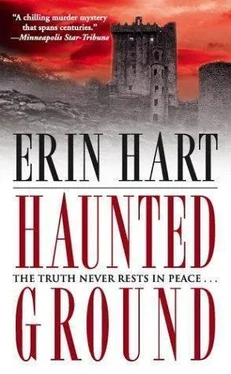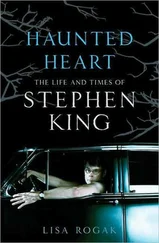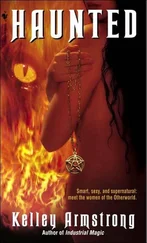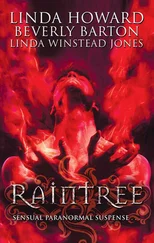“Ah indeed, don’t remind me.”
There was a pause. “I heard about your trouble, Gar. I’m sorry. It could have happened to any one of us.”
“Thanks, Jimmy,” Devaney said. Another brief silence. “I’m actually ringing for a favor. I’d never ask, but there’s nobody else who can help me out on this thing, only yourself.”
“Not in trouble with another superintendent, are you?”
“Not yet. Although if that fuckin’ magpie mentions his spotless divisional record to me one more time…I’ve actually just followed a suspect out to Shannon Airport. He caught a flight to Gatwick, should be arriving there at nine-fifty tonight. I was wondering—I mean, if you’ve nothing on—if you’d be up for a small bit of—”
“Surveillance?” Devaney could hear the surprise in his friend’s voice, and waited uneasily as Jimmy considered the proposal. It was a lot to ask.
“Just see where he goes from Gatwick?” Deasey asked. Devaney had him.
“That’s it, just tell me where he goes, who he talks to. Nothing strenuous.”
“What have you got on him?”
“Fuck-all, that’s the trouble. But his wife and kid have gone missing, and I can’t convince myself that he wasn’t somehow involved.”
“Could be interesting,” Deasey said. “Better give me the lowdown.” Devaney passed along the pertinent information: Osborne’s description and flight number. He could hear Deasey scribbling them down.
“Ring me at home, will you, Jimmy?” he said. “I’m heading there now. I’ll be up late.”
As he went home, Devaney timed the drive from Shannon to Dunbeg. It was no more than thirty miles as the crow flies, but there was no direct route, only branching secondary roads up through Sixmilebridge and then east on the Ennis road to Scarriff and Mountshannon. Couldn’t have taken Osborne less than an hour and forty-five minutes, providing that he drove without trying to attract attention. Including the walk from the plane, and out to the car park, that would have put him outside Dunbeg at 2:15 P. M. at the very earliest. So, if he had met his wife and son outside the town, taken them somewhere, and still returned to Bracklyn by 6 P. M., as Lucy Osborne reported, they’d have to be somewhere within a two-hour radius. Jesus. That was half of Clare and East Galway. He studied his road map, mentally drawing a circle around Dunbeg. That area included the lake, but it also included some remote and heavily forested mountains along the border. No fucking wonder they hadn’t been found. He’d see what the Badger came up with on Osborne’s trip to London, then suss him out about checking into that conference Osborne had attended at Oxford. If he was telling the truth about having to stop for a kip on the way home from the airport, who or what had kept him up so late the night before?
Deasey’s call came at a few minutes past eleven. “Well, that was a dead-easy job,” he said. “Your client left the airport, took a cab straight to a house in Christ Church. I’ve got him under obso now. Posh sort of a house for the area; he’s standing outside the door. I’ll check on the address for you in the morning. These fuckin’ mobile phones are great, aren’t they? What did we ever do before?”
“Is he letting himself in, Jimmy, or is somebody answering?”
“Hang on, let me get the specs on him. There’s a woman answering the door. Looks Pakistani, short hair, about thirty. Seems like he was expected. Big hug; she’s kissing him on the cheek.” Devaney felt a surge of adrenaline, as he had in the old days, chasing down a hooligan on foot. When he spoke, however, his voice was calm. “Are they alone?”
“Yeah,” said Deasey. “No—now it looks like he’s talking to somebody else.” There was a pause.
“What’s he doing now, Jimmy?”
“He’s just leaned over and picked up a kid.”
Una McGann had to use all her strength to knead the huge ball of brown bread dough on her kitchen table. The house seemed peaceful at the moment, with the occasional ray of early morning sun coming in, and the wireless tuned to Radio na Gaeltachta, the rhythmic waves of traditional music occasionally interrupted by the faint drone of the news in Irish. But it was a false tranquillity. Since Monday night the atmosphere in the house had been poisonous. Brendan and Fintan went about their work on the farm without uttering so much as a word to each other, and neither would speak more than two words to her. When they got home, each retreated to his room, venturing into the kitchen only when the other was safely out of the way. Brendan was still angry at both of them, and Fintan was furious with her for not leaving immediately—and for forcing him to stay, since he felt he couldn’t leave her and Aoife alone with Brendan after what had happened.
Una looked over at her daughter, who’d crept downstairs early and was now slumbering again on the sofa. The sun was beginning to cross Aoife’s bright hair, her face so smooth and relaxed in the oblivion of sleep. She was going to be tall, Una thought—unlike her mother. No doubt about that. She felt a surge of anger at Brendan. How dare he request a copy of Aoife’s birth certificate behind her back? She’d have shown him the bloody thing herself if he’d bothered to ask. And how dare he think it any of his business who Aoife’s father was? That’s what he’d been after, she was sure. There was only one person besides herself whose business it was, and that person was Aoife. She would be told when the time came. So far, it hadn’t been a problem, but Aoife was getting to the age where such things did matter. In a place like Dunbeg, the label of bastard still carried a lot of weight, far more than it had in Dublin, where half the children in their street had no known fathers at all. She’d better start working out what she would say to her daughter and to the world. Una had once half thought of making up some foreign student—a German, or a Swede, perhaps—who’d been at university when she was there, a short-lived romance with someone now totally out of the picture. There was no danger that such a man would ever resurface, since he was fictional.
That would be the simplest story to tell the outside world, but what about Aoife? She doubted that she could tell her daughter such a lie, but to tell her the truth meant telling everyone, since you couldn’t expect a child to keep that kind of confidence under pressure. And pressure there would be; no one could find the weakness in a person’s armor like a malicious eight-year-old in a schoolyard.
Brendan’s outburst had convinced her that she and Aoife must not be dependent on anyone. That’s what had prompted this flurry of activity, in preparation for the market day. Two hand-knitted jumpers and as much brown bread and seed cake as she could turn out in three days wouldn’t bring much, but Una knew she had to begin setting aside something so that she and her daughter could strike out on their own. It would be another year at least until the priory workshops were finished, and that was only working space, no living quarters, as far as she knew. Perhaps she could clean or cook in exchange for a little house or an apartment. She had rejected Fintan’s offer to bring them to America with him, knowing that it wasn’t what he really wanted, or what she and Aoife wanted either. The few years she’d spent in Dublin had given her a glimpse of a kind of desperation she did not want to see again. At least here you could grow your own vegetables, and the shops in the village, some of them, anyway, would keep a running total of your purchases that you could pay off as you were able. There was slightly more mercy here than in the city, she thought—about some things, not others. She knew people in the village remembered how she’d run away, shamed her family, and shamed them once again when she’d come back with a child in tow. Some still clucked over the fact that she’d only come home for her mother’s funeral, though it was more than three years past. There was no way not to be talked about. People in Dunbeg had nothing else of importance to occupy their minds. She could see it in their faces when she entered a shop, hear it in the polite conversation when they asked after Aoife, or remarked on how tall she was getting. People in Dunbeg seemed to have her whole life neatly summed, but sometimes she wanted to ask what they’d bloody well figured out, because it wasn’t at all clear to her.
Читать дальше











